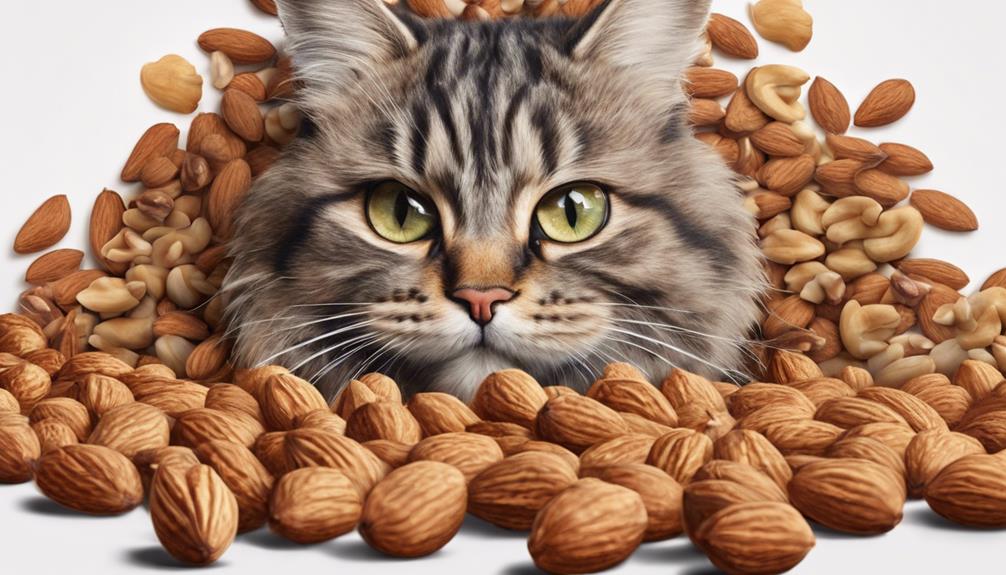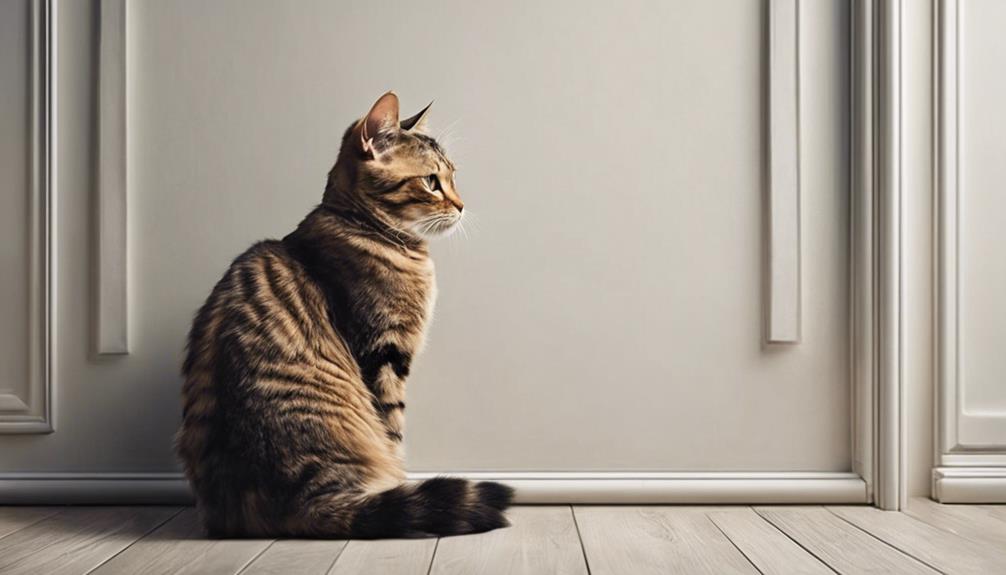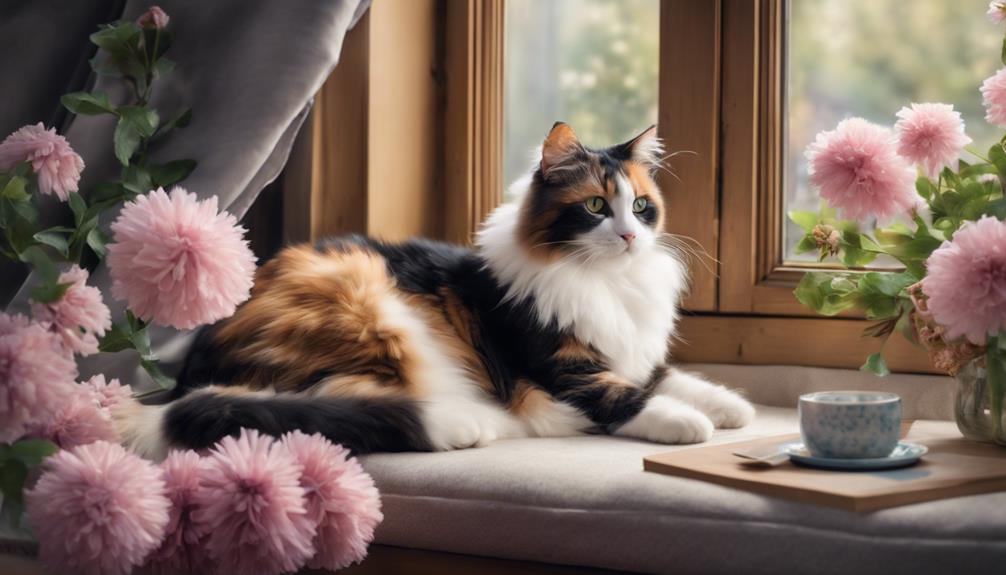Cats should steer clear of nuts due to potential health risks and choking hazards. Some nuts such as almonds, Brazil nuts, and cashews can cause stomach upset. Macadamia nuts are toxic to cats, while mold on walnuts and pecans can lead to seizures. Choking is a worry, particularly for kittens and older cats. Safe nuts like almonds, Brazil nuts, chestnuts, hazelnuts, and pecans are fine in moderation. It is important to always be on the lookout for signs of distress and consider seeking advice from a veterinarian if necessary. Stay tuned to discover more about how to keep your feline companion safe and healthy.
Key Takeaways
- Some nuts are safe in moderation for cats.
- Avoid toxic nuts like macadamia.
- Watch for signs of discomfort post-consumption.
- Choose safe alternatives like cat treats.
- Consult a vet if toxicity is suspected.
Risks of Feeding Cats Nuts
We need to be cautious about feeding cats nuts due to the risks associated with their high fat and calorie content. While some nuts like almonds, Brazil nuts, and cashews are considered important for cats in small amounts, they can still potentially lead to stomach upset. It's vital to remember that not all nuts are created equal when it comes to feline health.
Macadamia nuts, for example, should be avoided entirely as they're toxic to cats, causing symptoms like weakness and vomiting. Additionally, mold on walnuts and pecans can be harmful to cats, potentially leading to gastrointestinal issues and seizures. These risks highlight the importance of being mindful of what we offer our feline friends.
To keep our cats healthy and happy, it's best to steer clear of feeding them nuts altogether. Opting for safer alternatives like crunchy cat treats or pet-friendly peanut butter ensures that our furry companions can enjoy tasty snacks without putting their well-being at risk. Remember, their delicate stomachs deserve our utmost care and attention.
Potential Health Issues

Nuts can pose various health risks to cats, including potential allergic reactions, digestive issues, and toxicity concerns. Allergies may manifest through symptoms like itching, sneezing, or gastrointestinal disturbances.
It's important to be mindful of these potential health issues when considering feeding nuts to your feline companions.
Nut Allergies in Cats
Nut allergies in cats, although rare, can present serious health concerns, manifesting in symptoms such as vomiting, diarrhea, and skin issues. If your pet shows signs of allergic reactions like itching, swelling, or difficulty breathing after consuming nuts, seek immediate veterinary attention.
These allergies can range from important discomfort to severe anaphylaxis, a life-threatening condition. To diagnose nut allergies in cats, veterinarians may use blood tests, skin tests, or supervised elimination diets.
It's vital to avoid feeding nuts to cats with known allergies and to introduce new foods cautiously to prevent allergic reactions. Understanding and recognizing the signs of nut allergies in your feline friend can help you keep them safe and healthy.
Digestive Problems From Nuts
Experiencing digestive problems in cats can result from consuming nuts, leading to issues such as upset stomach, diarrhea, and pancreatitis. The high fat content in nuts can contribute to weight gain, potentially leading to obesity in our feline friends. Nuts have the potential to cause gastrointestinal issues like vomiting and abdominal discomfort in cats.
Additionally, nuts can pose a choking hazard, especially for kittens, small cats, and seniors due to their size and hard texture. Prioritizing caution when offering nuts to cats to prevent choking incidents. Moreover, nut particles stuck in a cat's teeth can result in dental problems and discomfort.
Prioritizing our cats' digestive health means avoiding nuts altogether to prevent these potential issues.
Toxicity Risk With Nuts
Consuming certain types of nuts can pose a toxicity risk to cats, potentially leading to various health issues such as weakness, vomiting, and tremors. Nuts like macadamia can be high in fat and are toxic to cats, causing these concerning symptoms. Mold on walnuts and pecans can also be harmful, resulting in gastrointestinal problems and even seizures in our furry friends.
While almonds, Brazil nuts, and cashews are generally safe in small amounts, they can still cause stomach upset in cats. It's best to steer clear of macadamia nuts entirely due to their uncertain toxicity. Additionally, nut particles stuck in a cat's teeth may lead to dental problems and discomfort.
Always keep a vigilant eye on your cat's diet to ensure their well-being and avoid any potential vomiting and diarrhea from nut consumption.
Choking Hazards to Watch For

Nuts can endanger our feline companions with the risk of choking, particularly when the pieces are too large or not appropriately prepared. Cats may have difficulty managing whole nuts, which could raise the chances of choking incidents.
It's essential for us to supervise and make certain that nuts are finely chopped to avoid any potential hazards and keep our cats safe.
Potential Choking Hazards
Being mindful of potential choking hazards is essential when it comes to feeding cats human foods. When considering nuts, small felines can face significant risks. Here are some key points to remember:
- Hard and Large Nuts: Cats may struggle to chew and swallow them, increasing the risk of choking.
- Vulnerable Cats: Small kittens and senior cats are more prone to choking on nuts due to their size and age.
- Splintering Hazards: Nuts can break into small pieces that could lead to choking incidents in cats.
Size and Shape
When considering the potential choking hazards for cats, it's important to be aware of the size and shape of the food they're being fed. Cats, with their small mouths and delicate throats, can easily choke on foods that are too large or have irregular shapes.
Nuts, in particular, can be a serious hazard due to their hard texture and round shape. These characteristics make it difficult for cats to chew them properly, increasing the risk of choking. Even small nuts can pose a danger, especially to smaller breeds, kittens, and older cats.
To keep our feline friends safe, it's best to avoid giving them whole nuts and opt for safer alternatives to prevent any choking incidents.
Supervision Is Crucial
Keeping a close eye on our feline companions is vital when it comes to identifying and addressing potential choking hazards they may encounter. When it comes to nuts and our cats, supervision is essential to guarantee their safety. Here are some key points to contemplate:
- Choking Hazard: Cats, especially kittens, small cats, and seniors, are at a higher risk of choking on nuts due to their size and shape.
- Dental Problems: Nut particles stuck in a cat's teeth can lead to dental issues if not promptly addressed through proper supervision.
- Gastrointestinal Upset: Cats should be monitored for any signs of gastrointestinal upset if they accidentally ingest nuts, requiring immediate attention to prevent further complications.
Dental Problems Associated With Nuts

Regularly checking our cats' teeth for signs of nut particles or dental issues is vital to prevent potential plaque buildup and decay. Nuts, despite being high in fat and a tasty treat for us, can pose risks to our feline friends' dental health.
Nut particles stuck in cats' teeth can lead to plaque buildup, increasing the chances of dental decay over time. Chewing on hard nuts may also cause fractures or damage to their teeth, leading to discomfort and potential dental issues.
Additionally, ingesting nuts can result in gum irritation and possible gum disease in cats, affecting their overall oral health. It's important to be mindful of these risks and to monitor our cats closely after they've had nuts to make sure their teeth are free of any particles that could cause problems.
Safe Nuts for Cats in Moderation

We all know that cats love their treats, but when it comes to nuts, moderation is key.
While almonds, Brazil nuts, chestnuts, hazelnuts, and pecans are generally safe for cats, it's important to take into account the nutritional benefits they offer and the potential risks of overconsumption.
Nutritional Benefits for Cats
Indulging feline companions with safe nuts like almonds, Brazil nuts, chestnuts, hazelnuts, and pecans can offer moderate nutritional benefits when given in controlled amounts. These nuts, when incorporated into a balanced diet, can provide essential nutrients for your cat's well-being.
Here are some nutritional benefits for cats:
- Almonds: Rich in healthy fats and antioxidants, almonds can support your cat's skin and coat health.
- Brazil Nuts: High in selenium, Brazil nuts can help boost your cat's immune system.
- Pecans: Pecans contain vitamins and minerals that contribute to your cat's overall health.
Potential Risks of Overconsumption
When considering the safety of nuts for cats, it's important to be mindful of the potential risks associated with overconsumption, especially when offering these treats in moderation. Cats metabolize fats differently from humans, and nuts are high in fat content, which can lead to weight gain and even pancreatitis if consumed excessively.
Additionally, nuts with shells can pose a choking hazard, particularly for kittens, small cats, and seniors. It's essential to monitor portion sizes and make sure that the nuts are shelled and unsalted before offering them to your feline friend.
Furthermore, moldy nuts like walnuts and pecans can contain toxins that are harmful to cats if ingested. Keeping a watchful eye on your cat's nut intake can help prevent any potential health issues down the line.
Almonds, Brazil Nuts, Cashews
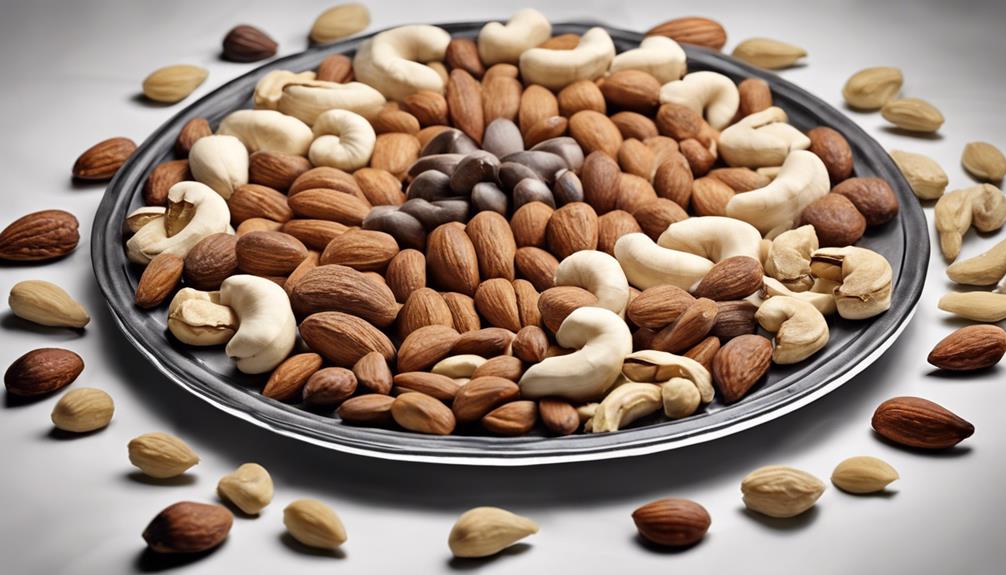
Almonds, Brazil nuts, and cashews are popular nuts that cat owners may consider offering their feline companions as treats. When it comes to cats eating nuts, there are some important points to keep in mind:
- Almonds: While almonds are generally safe for cats in small amounts, they contain cyanogenic glycosides that can potentially lead to cyanide poisoning. Hence, it's essential to offer almonds sparingly to avoid any adverse effects.
- Brazil Nuts: These nuts aren't recommended for cats due to their high caloric content and the potential for causing digestive issues. It's best to steer clear of Brazil nuts when looking for treat options for your feline friend.
- Cashews: Cashews should be avoided for cats as they can pose choking hazards and may result in stomach upsets like diarrhea. Opting for safer treat alternatives is advisable to keep your cat healthy and happy.
Hazards of Macadamia, Walnuts, Pecans

Macadamia nuts, walnuts, and pecans pose specific hazards for cats due to their potential toxicity and digestive effects.
Macadamia nuts are known to be harmful to cats, leading to symptoms like weakness, vomiting, and tremors.
Mold present on walnuts and pecans can also be detrimental to our feline friends, causing gastrointestinal issues and even seizures.
While pecans aren't definitively harmful, they can still result in digestive upset if consumed in large quantities.
Handling these nuts carefully is crucial to prevent accidental ingestion and potential health risks for our beloved cats.
Even though the exact toxicity of macadamia nuts remains uncertain, it's best to err on the side of caution and avoid them altogether to safeguard our furry companions.
Being mindful of what our cats come into contact with and ensuring they steer clear of these nuts can help prevent any unwanted complications and keep them safe and healthy.
Signs of Nut Toxicity in Cats

Signs of nut toxicity in cats can manifest as weakness, vomiting, and tremors after ingestion. These symptoms are vital indicators that something is amiss with your feline friend. If you suspect your cat has ingested toxic nuts, it's essential to be vigilant for the following signs:
- Gastric Upset: Watch out for any signs of stomach discomfort in your cat, such as excessive drooling or abdominal pain.
- Intestinal Blockages: Keep an eye on your cat's litter box habits. Changes in bowel movements, constipation, or diarrhea could signal potential intestinal blockages.
- Need for Veterinary Attention: If you notice any of these symptoms, seeking immediate veterinary attention is paramount. Professional care can help prevent further complications and safeguard your cat's well-being.
Symptoms of Ingesting Toxic Nuts

When cats ingest toxic nuts, they might exhibit symptoms like weakness, vomiting, and tremors. It's vital to seek immediate veterinary care if you suspect your cat has consumed a toxic nut.
Common poisoning symptoms to watch out for include gastric upset and potential obstruction of the digestive tract.
Dangerous Nut Types
Experiencing symptoms of weakness, vomiting, and tremors can be indicative of ingesting toxic nuts, posing a danger to cats. When it comes to dangerous nut types for our feline friends, here are some key points to bear in mind:
- Macadamia nuts: These are highly perilous to cats and can lead to severe symptoms like weakness, vomiting, and tremors.
- Moldy walnuts and pecans: The mold on these nuts can cause gastrointestinal issues and even seizures in cats.
- Almonds, Brazil nuts, and cashews: While safe in small amounts, these nuts can still induce stomach upset in cats.
It's important to be mindful of these dangers and make sure our cats stay far away from these harmful nut varieties to keep them safe and healthy.
Immediate Veterinary Care
Seek immediate veterinary care if your cat displays symptoms of weakness, vomiting, tremors, or gastrointestinal upset after ingesting toxic nuts. Contact your veterinarian right away, as certain nuts are high in fat and can cause pancreatitis in cats. Remember, some nuts that are toxic to dogs may also be harmful to your feline friend. To help you understand better, here is a table showing common symptoms of ingesting toxic nuts in cats:
| Symptoms | Description | Action |
|---|---|---|
| Weakness | Lethargy or lack of energy | Contact vet ASAP |
| Vomiting | Forceful expulsion of stomach contents | Seek urgent care |
| Tremors | Involuntary shaking or quivering | Immediate attention |
Stay vigilant and monitor your cat closely; quick action can prevent serious health complications.
Common Poisoning Symptoms
Consuming harmful nuts can lead to various symptoms in cats, including weakness, vomiting, and tremors. If your feline friend ingests toxic nuts, be on the lookout for these signs of poisoning:
- Weakness: Your cat may appear lethargic or have trouble moving around.
- Vomiting: Look out for frequent bouts of throwing up.
- Tremors: Shaking or trembling could indicate a serious issue.
If you notice any of these symptoms or suspect your cat has ingested toxic nuts, it's important to seek immediate veterinary attention. Gastrointestinal upset and potential risks like obstruction or poisoning can result from nut toxicity, causing harm to your cat's health.
Alternatives to Nuts for Cats

When searching for safe alternatives to nuts for cats, crunchy cat treats are a recommended option to explore. These treats offer a similar crunch to nuts but are specifically designed for feline consumption, ensuring your cat can enjoy a tasty snack without any potential risks.
Additionally, pet-friendly peanut butter, when given in moderation, can be a suitable treat option for cats. It provides a delicious flavor without the dangers associated with nuts. It's important to opt for cat treats that are low in sodium and free of added sugars to prioritize your cat's health and well-being.
Crunchy Cat Treats Recommendation

Enjoying a variety of crunchy cat treats can provide your feline companion with a safe and satisfying snacking experience. When selecting cat treats, opt for those that are specifically designed for cats to guarantee they meet their nutritional needs. These treats are formulated to be easily digestible and safe for cats to enjoy without any adverse effects, unlike nuts which can pose health risks. Here are some reasons why crunchy cat treats are a great choice for your furry friend:
- Safe Consumption: Crunchy cat treats are a safer alternative to nuts, reducing the risk of choking hazards and digestive issues in cats.
- Nutritional Benefits: Cat treats are packed with essential nutrients that contribute to your cat's overall health and well-being.
- Satisfying Texture: These treats mimic the crunch of nuts, offering a similar sensory experience for your cat without the potential dangers associated with nuts.
Pet-Friendly Peanut Butter Tips
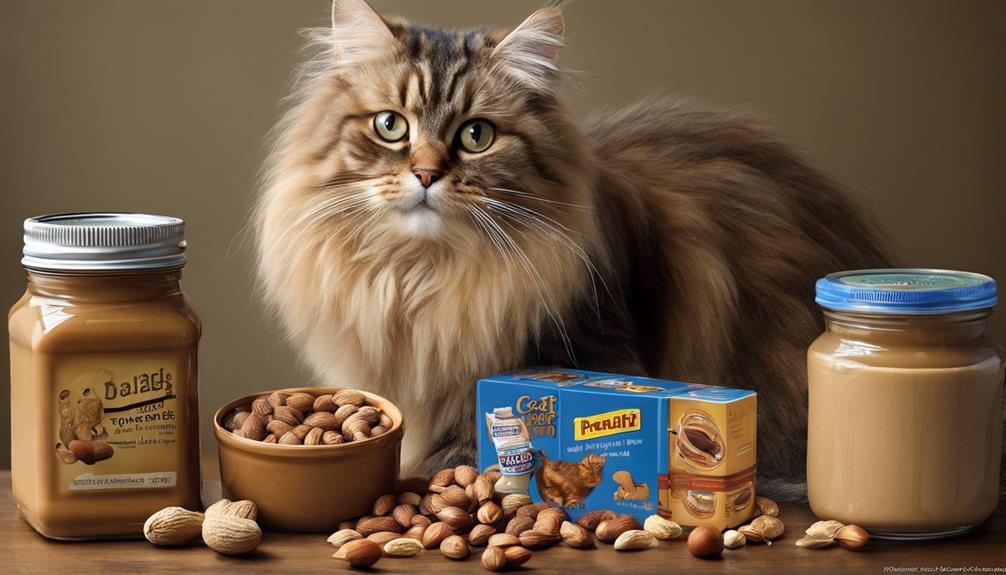
When considering peanut butter for cats, it's crucial to select a pet-friendly option that prioritizes their health and well-being. Pet care involves choosing unsalted, sugar-free peanut butter to avoid potential health risks. Confirm the peanut butter does not contain xylitol, a harmful sweetener for cats. Moderation is key with high-fat peanut butter; small amounts can be a tasty treat for cats occasionally. Always verify the ingredient list to guarantee it's safe for feline consumption.
| Pet-Friendly Peanut Butter Tips | |
|---|---|
| Choose Unsweetened, Unsalted Peanut Butter | Prioritize Health and Well-being |
| Avoid Xylitol, Harmful Sweetener for Cats | Moderation Prevents Weight Gain |
| Check Ingredients List for Safety | Small Amounts as Occasional Treat |
Monitoring Cats Nut Consumption

To safeguard your cat's well-being, closely monitor their consumption of nuts to prevent potential health issues. Even a small amount of nuts can be harmful to cats due to their high-fat content, which can cause stomach upset and other digestive problems. Here are three essential tips to guarantee your feline friend stays healthy:
- Watch for Signs of Discomfort: Keep an eye out for any changes in behavior, such as vomiting, diarrhea, or lethargy, which could indicate that your cat has ingested nuts and is experiencing digestive issues.
- Inspect Their Teeth: Regularly check your cat's teeth for any nut particles stuck in between or signs of damage caused by chewing on nuts. This can help prevent dental problems that may arise from nut consumption.
- Be Vigilant and Responsive: If you notice any distress or unusual symptoms in your cat after they've eaten nuts, make sure to monitor them closely and seek veterinary assistance promptly to address any potential health concerns.
Consulting a Vet When Needed

When observing distress symptoms in your cat post-nut consumption, seeking veterinary advice promptly is essential to guarantee proper assessment and care. Cats shouldn't eat nuts as they're high in fat and can lead to various health issues.
If you notice any unusual behavior in your feline friend after they've ingested nuts, contact your veterinarian right away. Nuts are toxic to cats and can cause symptoms like vomiting, diarrhea, lethargy, and even neurological problems.
Professional help is vital in identifying these signs of toxicity and providing the necessary treatment. Your vet can offer guidance on the potential risks associated with nut consumption and recommend appropriate actions to ensure your cat's well-being.
Ensuring Cats Health and Safety

Maintaining the health and safety of cats is crucial for their overall well-being and longevity. When it comes to guaranteeing your feline friend stays healthy and safe, there are a few key points to keep in mind:
- Avoid Nuts: Nuts are high in fat and can cause digestive issues in cats. Some nuts, like macadamia nuts, are toxic to cats and should be kept far away from them to prevent any potential harm.
- Monitor for Symptoms: Keep an eye out for signs of choking, upset stomach, or dental problems if your cat ingests nuts accidentally. These symptoms could indicate a serious issue that requires immediate attention.
- Opt for Safer Options: Instead of offering nuts to your cat as a treat, consider safer alternatives like specially made cat treats or engaging toys. This way, you can guarantee that your furry companion stays healthy and happy without risking any toxic or harmful effects from nuts.
Frequently Asked Questions
What Nuts Are Toxic to Cats?
Nuts toxic to cats include macadamia, moldy walnuts, and pecans. Safe nuts in moderation are almonds, Brazil nuts, and cashews. It's best to avoid macadamia nuts due to uncertainty. Mold on walnuts and pecans poses risks.
Is It OK for My Cat to Eat Peanuts?
Eating peanuts may upset a cat's stomach due to their high fat content and cats lacking enzymes to digest nuts efficiently. It's best to avoid feeding peanuts to cats and stick to treats suited for them.
Are Almonds OK for Cats to Eat?
In the domain of feline treats, almonds can be a delightful addition. Their nutritional perks, like healthy fats and vitamin E, make them a tasty and beneficial choice. Remember, moderation is key for our furry friends.
Are Cashews Safe for Cats?
Cashews are not recommended for cats due to their high fat content and potential to cause stomach upset. While not toxic, they can lead to diarrhea or choking hazards. Safer alternatives exist for feline snacks.
Are Nut Allergies Common in Cats and Can Nuts Harm Them?
Nut allergies are not common in cats, and nuts can harm them, especially if ingested in large quantities. It’s important to keep all nuts away from your feline friend to prevent any potential harm to their health, including their delicate cat toe beans falling off.
Conclusion
To summarize, while cats can enjoy a small amount of certain nuts as a treat, it's crucial to be cautious due to potential health risks.
Did you know that almonds are safe for cats in moderation, providing healthy fats and protein?
By monitoring your cat's nut consumption and consulting with a vet when needed, you can guarantee their health and safety.
Remember, always prioritize your feline friend's well-being when introducing new foods into their diet.
